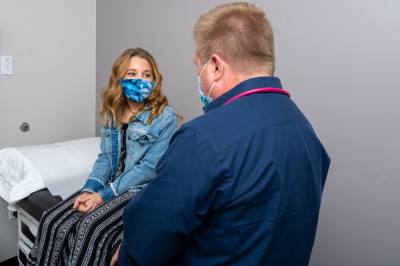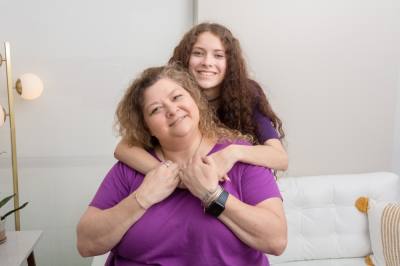Adjusting to life in a pandemic has not been easy for anyone, but for many children and teenagers, COVID-19 has deeply affected their physical, mental and emotional well-being. At Austin Regional Clinic, pediatricians work to make sure that strong mental wellness in young people is as crucially treated as their physical health.
Natasha B. Ahmed, MD, pediatrician at Austin Regional Clinic Sendero Springs in Round Rock, said she has always had a special interest in adolescent medicine, which naturally led to a focus on how mental health and behavioral disorders affect children and teenagers.
“No matter how intelligent they are, [children and teenagers] just don’t have the emotional bandwidth to be able to describe a lot of the things that they’re feeling,” Dr. Ahmed said. “They’re still processing it, so even naming those emotions becomes a really difficult thing for them.”
Identifying mental health issues in youth can be complicated, but knowing the signs to watch for can help parents know when an issue is arising. Dr. Ahmed said one tell-tale sign is negative changes in routine, such as sleeping too much or too little, feeling guilty even about small things, and reluctance to do activities that were once enjoyable.
Mood disorders can also present in physical symptoms that do not have other explanations. Whether it be a stomach ache, racing heart, headaches or constant fatigue, anxiety and depression can manifest in a variety of ways.
“I have a decent amount of teenage and young girls who have abdominal pain ... and then when you dive a little deeper, you find out that every time they’re stressed out, their stomach starts hurting,” Dr. Ahmed said. “A very common thing for children is to have physical symptoms that have some underlying psychological component.”
During the pandemic, social isolation and processing hardships have also been catalysts for declines in mental well-being. Though these circumstances are difficult at any age, adolescents have been forced to learn how to cope during one of the most vulnerable transition periods in life.
“Several of my colleagues and I have had patients who lost a parent to COVID, and they asked, ‘Because I played with my friend and then my parent got sick, did I kill my parent?’” Dr. Ahmed said. “That’s an intense and complex thought for anyone, but exceedingly overwhelming for kids at this age to experience.”
The pandemic also forced minors into virtual schooling, which made it difficult for some students with ADHD and ADD to self-regulate at home, Dr. Ahmed said. In addition to anxiety and depression, she has seen an influx of new ADHD and ADD diagnoses as parents finally witnessed the struggles their childrens’ teachers have had helping them stay on task or following directions. Then, returning to in-person classes proved to be a challenge for many who struggle with anxiety.
“The transition back to in-person school is very difficult for them. They just don’t know how to have those face-to-face interactions anymore,” Dr. Ahmed said.
The biggest overlap and easiest identifier for ADHD, ADD, anxiety and depression tends to be difficulty concentrating. When any symptom of mental illness or a behavioral disorder begins to suddenly affect a child’s functional ability, it is time to seek help.
“Mental health has always been under-addressed and underfunded and the COVID pandemic has made that so much worse. The truth is, the resources are just not there in the community to support the rapidly expanding need for mental health care,” Dr. Ahmed said. “It’s so helpful to have a pediatrician who feels adequate at treating mental health because we can’t always get them in to see a therapist or a psychiatrist.”
In accordance with a recommendation from the American Academy of Pediatrics, routine pediatric visits at ARC for children ages 12 and up include screenings for anxiety and depression. Patients answer questions about their emotions and habits that help physicians identify potential issues and direct them to a therapist if needed or may open the discussion to medication if therapy is already ongoing.
“If we look at that questionnaire and see that it is elevated, that’s a sign for us to talk more about the way they answered the questions and if needed, schedule a separate visit to talk about it in greater detail,” Dr. Ahmed said. “That’s why it is so important not to skip those well-check visits.”
Children can always discuss mental health issues privately with their pediatrician. Often, they might disclose information about their emotional state, so they should be encouraged to have time alone with their doctor if they choose.
In addition to screenings, ARC has pediatricians in each region who are able to provide a higher level of care through medication management, which involves diagnosing and treating ADHD, anxiety, and depression.
While regular mental checks are key in keeping up with a child’s overall health, Dr. Ahmed said that parents can help their child at home by having a validating and non-judgemental attitude when their child is showing signs of concerning behavior.
“I really want to emphasize how parents can start a conversation with their children, because I think that’s probably the thing that parents struggle with the most,” Dr. Ahmed said. “Try saying something like, ‘I’ve noticed you have been doing a little less talking/playing/eating, is everything okay? Are you worried about anything? I promise not to get mad but I’m here if you want to talk.’ Kids who feel like they have a supportive family and support structure do much better.”
Austin Regional Clinic has 23 locations across Austin and Central Texas with pediatricians available to help determine the kind of help a child needs and direct them to the appropriate resources.
Learn more about pediatric mental health services at Austin Regional Clinic, read reviews for pediatricians in your area and book a wellness check at https://www.austinregionalclinic.com/.
The above story was produced by Community Impact's Storytelling team with information solely provided by the local business as part of their "sponsored content" purchase through our advertising team. Our integrity promise to our readers is to clearly identify all CI Storytelling posts so they are separate from the content decided upon, researched and written by our journalism department.
Select your community
Support Us
News
- Austin Metro
-
Houston Metro
- Houston Metro Home
- Bay Area
- Bellaire | Meyerland | West University
- Conroe | Montgomery
- Cy-Fair | Jersey Village
- Cypress
- Heights | River Oaks | Montrose
- Katy | Fulshear
- Lake Houston | Humble | Kingwood
- New Caney | Porter
- Pearland | Friendswood | Manvel
- Spring | Klein
- Sugar Land | Missouri City
- The Woodlands
- Tomball | Magnolia
- Dallas | Fort Worth Metro
- San Antonio Metro









